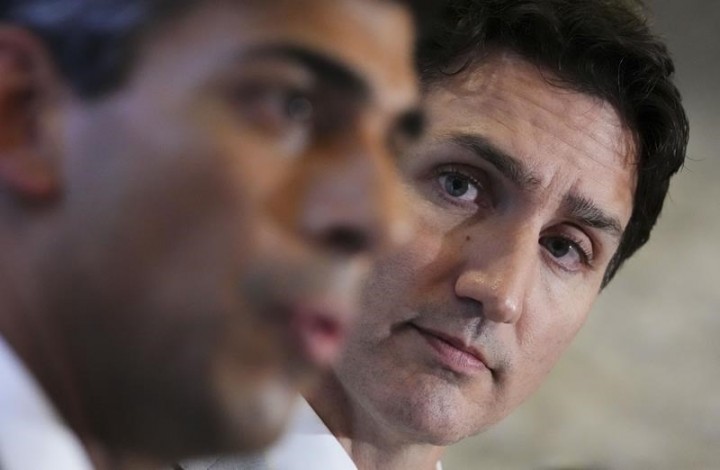NUSA DUA, Indonesia — Prime Minister Justin Trudeau is extending Canada’s training mission of Ukrainian soldiers after reports that a missile killed two people in Poland on Tuesday, though world leaders are urging calm as early findings suggest it was not an intentional attack.
“There is no confirmation of exactly what happened yet; there needs to be a proper investigation,” Trudeau told reporters Wednesday on the sidelines of the G20 in Bali, Indonesia.
“One thing is absolutely clear, whether it was direct or indirect responsibility, Russia is responsible for what happened.”
Polish media reported that two people died Tuesday afternoon after a projectile struck an area where grain was drying in Przewodów, a village near the border with Ukraine.
Polish President Andrzej Duda said there are no signs that the blast was a deliberate attack.
“Ukraine’s defence was launching their missiles in various directions and it is highly probable that one of these missiles unfortunately fell on Polish territory,” said Duda. “There is nothing, absolutely nothing, to suggest that it was an intentional attack on Poland.”
NATO Secretary-General Jens Stoltenberg, at a meeting of the military alliance in Brussels, echoed the preliminary Polish findings.
“We have no indication that this was the result of a deliberate attack,” he said.
The early assessments of the missile landing appeared to reduce the likelihood that the strike would trigger another major escalation in the ongoing war sparked by Russia’s invasion of Ukraine in February. A deliberate attack could have risked involving NATO in the conflict.
At the same time, Stoltenberg and others, including Trudeau, laid overall but not specific blame on Russian President Vladimir Putin’s war.
“This is not Ukraine’s fault. Russia bears ultimate responsibility,” Stoltenberg said.
In Indonesia, Trudeau told reporters that there must be an investigation into what happened and no escalation, but said Russia bears the blame for starting the conflict.
He spoke alongside British Prime Minister Rishi Sunak, who echoed Trudeau’s views.
“I think the right thing now is for everyone to just calmly ascertain exactly what happened, gather the facts,” Sunak said.
“Until we have a definitive answer, it’s right that everyone just remains calm.”
The pair also spoke Wednesday with Ukrainian President Volodymyr Zelenskyy.
“We stressed the importance of a full investigation into what happened in Poland and we made it clear that Putin’s invasion of Ukraine is ultimately to blame for this violence,” Trudeau said in a news conference.
Trudeau announced Wednesday that a mission to train Ukrainian soldiers in Britain as part of what’s called Operation Unifier, which has been ongoing since 2015, will be extended up to the end of 2023. The announcement comes just days after Canada pledged another $500 million to support Ukraine’s military.
Earlier Wednesday, Trudeau took part in a meeting with all other G7 leaders as well as the Netherlands and Spain who are members of the NATO military alliance.
In a joint statement, the leaders said they “condemn the barbaric missile attacks that Russia perpetrated on Ukrainian cities and civilian infrastructure.”
The leaders reaffirmed their support for Ukraine and the Ukrainian people in the face of ongoing Russian aggression, “as well as our continued readiness to hold Russia accountable for its brazen attacks on Ukrainian communities.”
The Polish government confirmed that its foreign minister summoned the Russian ambassador on Tuesday and “demanded immediate explanations,” in a statement that came shortly after Zelenskyy decried the missile strike as a “very significant escalation.”
Former Soviet-bloc country Ukraine maintains stocks of Soviet- and Russian-made weaponry, including air-defence missiles, and has also seized many more Russian weapons while beating back the Kremlin’s invasion forces.
The Associated Press had reported on Tuesday, based on two sources including a U.S. intelligence official, that Russian missiles had crossed into Polish territory during a massive barrage that hit Ukraine’s power grid and cut electricity to much of Moldova.
Ukrainian air defences worked furiously against the Russian assault, including in Ukraine’s western region that borders Poland. Ukraine’s military said 77 of the more than 90 missiles fired were brought down, along with 11 drones.
The NATO alliance was formed after the Second World War as a check against the Soviet Union and currently has 30 members spread across North America and Europe.
The keystone of its founding treaty, Article 5, stipulates that any “armed attack” against one member constitutes an attack against all, and may trigger a self-defence response from allies as a bloc.
Had Tuesday’s events been determined to be deliberate, it was unclear whether they would fall under that category, or if they may fall under Article 4, which says member states can convene a consultation with other members if they feel their security or independence are threatened.
Before the Polish and NATO assessments, U.S. President Joe Biden had said it was “unlikely” that Russia fired the missile but added: “I’m going to make sure we find out exactly what happened.”
The Kremlin on Wednesday denounced Poland’s and other countries’ reaction to the missile incident as “hysterical” and, in rare praise for a U.S. leader, hailed the “restrained and much more professional” reaction of the U.S.
“We have witnessed another hysterical, frenzied, Russophobic reaction that was not based on any real data,” Kremlin spokesman Dmitry Peskov told reporters on Wednesday.
He added that “immediately, all experts realized that it could not have been a missile linked to the Russian armed forces,” and pointed to a “restrained, much more professional reaction” of the U.S.
This report by The Canadian Press was first published Nov. 16, 2022.
— With files from Marie-Danielle Smith, Lee Berthiaume and The Associated Press
Dylan Robertson, The Canadian Press
Note to readers: CORRECTS spelling of Unifier
Related


































